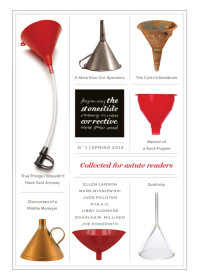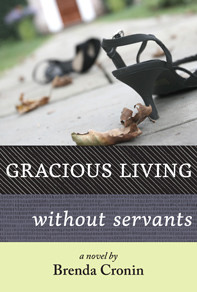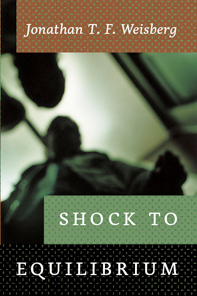you bear that foolish, ill-spirited bumblers keep moving ahead. It saves you from noticing your own flaws.
The Rejection Generator has gone beyond even what we imagined it could accomplish. It is helping people examine their deepest motivations and set new directions for their lives.
Thank you for your help. I have been feeling this way as a writer for years and having a print confirmation of it allows me to move on with my life so that I can now study how to make wicker furniture.
Fiction just won’t pay the bills, but wicker they say is a growth industry.
Sincerely,
Matthew Brent Jackson
Congratulations, Brent on this exciting new direction in your life! (Read what may be Brent’s farewell to the literary life, an essay titled “The Missouri Exile.“)
Commenters on Twitter have also reported great efficacy.
“I haven’t had this much fun since the invention of the printing press…”
“Oh this is so great… Putting the fun into rejection. Yes!”
“The Rejection Generator should be required for all writers…”
“I just rejected myself as the Southern Gentleman. GENIUS.”
“About time something like this was invented. LOL”
Sadly, we have to report to you that Sylvester Stonesman, one of the co-creators of The Rejection Generator, has let all of this go to his head. He spent the last $500 dollars in his checking account on an iPad so that he could easily show the website to strangers. He has been going to coffee shops and other places with free wifi and accosting anyone who will stop to listen to him. He tries to make people read all seven letters that are available at that time and then calls into headquarters to ask us to jog the machinery and rotate letters. We always ask him where he is this time, but he doesn’t answer. If you see him, please let us know. His wife is becoming worried and tells us he has a lot of chores backing up. She has hinted that if he doesn’t do them, she will expect us to come over and mow the lawn, etc., since it was our project that took him away. Please let us know. He’s wearing a grey sport coat, yellow shirt, and jeans.
by Tia Creighton
I wouldn’t call my dad cheap. He was crafty. With five kids on a teacher’s salary he had to be. I remember going into Macy’s one time with him and my brother Toby to buy Toby a pair of slacks for an upcoming family wedding. Toby picked out a pair that came with a cheap, nearly burlap belt included in the loops. My dad held up the pants, said, “Fine,” then stepped over to the rack of belts for sale. He switched out the gratis belt for a new, black, leather one and took the pants to the counter for purchase. The clerk didn’t catch on that the new belt was not meant as part of the ensemble and rang up the pants. Sure it was shoplifting, but my dad called it “Tricks of Life.” [Read more…]
Life is inseparable from art. That is part of the reason we at The Stoneslide Corrective so closely study the circumstances around the composition of great works of art through our Writers at Work series.
William Butler Yeats had a life rich in event and literary production. He was deeply involved in politics, founded a successful theater, and led a literary movement. Here we study how, amidst political upheaval, romantic turmoil, and personal disappointments, he manages to focus the might of his intellect and compose the powerful first lines of “A Dialogue of Self and Soul.”
The Stoneslide Corrective occasionally studies early drafts of writings, in order to learn, to instruct, to grow, and sometimes in order to explore for the sheer enjoyment of compositional exploration. Consulting the work of scholars, archivists, biographers, librarians, private foundations and repositories, and, when appropriate, consulting the writers themselves, we re-create the process through which a work was brought into being, often including the many drafts writers go through.
Note: All historical work is verified by HistoriRight, Inc.
Unless you’re at church, temple, mosque, or a court proceeding, do feel free to turn up the volume of the device you’re using to read this (except your brain, of course; please don’t turn up that device’s volume).
Researchers have discovered that “the global hegemony of American culture and its gestural memes” has made a certain hand signal a no-no everywhere in the world. However, the researchers also calculate that this gesture commonly called “the finger” added more than $200 billion to the world economy over the last decade because “cultural hegemony has the benefit of increasing the efficiency of numerous exchanges.”
In a study published in the scientific journal Implied Outcomes, behavioral linguists Luella Tufts and Margaret Kuneeley and economist Beaufort James found that even in the remotest regions of the planet, “the finger” is now offensive. As recently as the 1990s, this was not the case, their research shows.
A little context: in their highly regarded book, Language Development: Foundations, Processes, and Clinical Applications, Brian B. Schulman and Nina C. Capone detail the acquisition and deployment of communication and communicative memes. One part of non-verbal communication the authors treat is what theorists and clinicians call the emblem gesture. Emblem gestures are signal deployments that, within a culture, mean the same thing to all members of that culture: two common ones are the high five and the thumbs-up.
Schulman and Capone also give this caveat: “Note that in some cases, an emblem gesture can be considered benign in one culture but offensive in another culture.”
The work of Tufts et al. explores what happens when, as a result of cultural homogenization, an emblem gesture becomes universal.
The researchers recruited American tourists or other appropriately Westernized people and sent them into remote areas and documented them using the gesture with indigenous people. [Read more…]
by Tracy Elin
Wayne had never thought to write a poem before. When the impulse struck him in his 77th year, he attributed it to the weakness of aging.
He’d raised three boys without ever writing a poem. He’d outlived his wife by 30 years, managing all the household chores, and never written a poem. He’d worked as a foreman at a mining pit, he’d run his own machine shop, and after the recession of the early ’90s, he’d kept the books for a number of small businesses, and in all that time, he’d never felt the need to put his thoughts into verse.
He’d probably read a poem, though he couldn’t recall a specific one. In the Bible, surely. And people said music lyrics were like poems, and he had always been a fan of the true music of the Appalachian region. He wasn’t likely to encounter a poem in his house; the books were mostly technical manuals from his working days, as well as a single shelfful of westerns he reread from time to time. His wife had read a number of books about glamorous people doing inappropriate things, and those were still around somewhere.
But that day when he noticed the scratch pad near the telephone, Wayne sat down and then tapped the pencil a few times before writing: [Read more…]
- « Previous Page
- 1
- …
- 14
- 15
- 16
- 17
- 18
- …
- 21
- Next Page »



